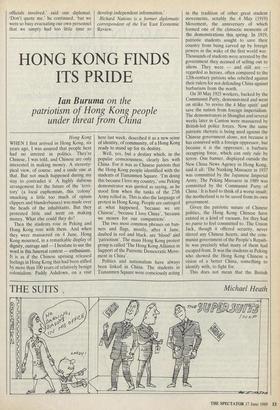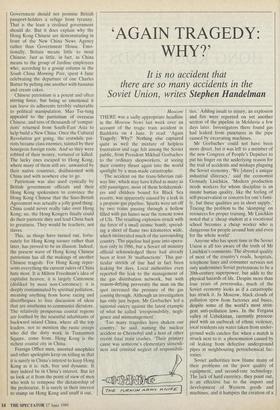HONG KONG FINDS ITS PRIDE
Ian Buruma on the
patriotism of Hong Kong people under threat from China
Hong Kong WHEN I first arrived in Hong Kong, six years ago, I was assured that people here had no interest in politics. They're Chinese, I was told, and Chinese are only interested in making money. A stereoty- pical view, of course, and a snide one at that. But not much happened during my stay to . contradict it. A highly dubious arrangement for the future of the `terri- tory' (a local euphemism, this 'colony' smacking a little too much of opium clippers and blunderbusses) was made over the heads of the inhabitants. But they protested little and went on making money. What else could they do? Then the students rose in Peking and Hong Kong rose with them. And when they were massacred on 4 June, Hong Kong mourned, in a remarkable display of dignity, outrage and — I hesitate to use the word in this funereal context — enthusiasm. It is as if the Chinese uprising released feelings in Hong Kong that had been stifled by more than 100 years of relatively benign colonialism. Paddy Ashdown, on a visit here last week, described it as a new sense of identity, of community, of a Hong Kong ready to stand up for its destiny.
Well, yes, but a destiny which, in the popular consciousness, clearly lies with China. For it was as Chinese patriots that the Hong Kong people identified with the students of Tiananmen Square. 'I'm doing this because I love my country,' one Peking demonstrator was quoted as saying, as he stood firm when the tanks of the 27th Army rolled in. This is also the language of protest in Hong Kong. People are outraged at what happened, 'because we are Chinese', 'because I love China', 'because we mourn for our compatriots'. The two most common phrases on ban- ners and flags, Mostly, after 4 June, daubed in red and black, are 'blood' and `patriotism'. The main Hong Kong protest group is called 'The Hong Kong Alliance in Support of the Patriotic Democratic Move- ment in China'.
Politics and nationalism have always been linked in China. The students in Tiananmen Square were consciously acting in the tradition of other great student movements, notably the 4 May (1919) Movement, the anniversary of which formed one of the climactic moments of the demonstrations this spring. In 1919, patriotic students sought to save their country from being carved up by foreign powers in the wake of the first world war. Thousands of students were arrested by the government they accused of selling out to aliens. They were — and still are regarded as heroes, often compared to the 12th-century patriots who rebelled against their rulers for not defending China against barbarians from the north.
On 30 May 1925 workers, backed by the Communist Party, demonstrated and went on strike `to revive the 4 May spirit' and save the nation from foreign imperialism. The demonstrators in Shanghai and several weeks later in Canton were massacred by British-led police forces. Now the same patriotic rhetoric is being used against the Chinese government alone, not because it has connived with a foreign oppressor, but because it is the oppressor, a barbaric occupying force, which can only rule by terror. One banner, displayed outside the New China News Agency in Hong Kong, said it all: 'The Nanking Massacre in 1937 was committed by the Japanese Imperial Army. The Peking Massacre in 1989 was committed by the Communist Party of China.' It is hard to think of a worse insult; the motherland is to be saved from its own government.
Given the patriotic nature of Chinese politics, the Hong Kong Chinese have existed in a kind of vacuum, for they had no patrie to feel committed to. The Union Jack, though it offered security, never stirred any Chinese hearts, and the com- munist government of the People's Repub- lic was precisely what many of them had escaped from. It was the students in Peking who showed the Hong Kong Chinese a vision of a better China, something to identify with, to fight for.
This does not mean that the British Government should not promise British passport-holders a refuge from tyranny. That is the least a civilised government should do. But it does explain why the Hong Kong Chinese are demonstrating in front of the New China News Agency rather than Government House. Emo- tionally, Britain means little to most Chinese. Just as little, in fact, as China means to the group of Jardine employees who, according to a gossip column in the South China Morning Post, spent 4 June celebrating the departure of one Charles Butter by pelting one another with bananas and cream cakes.
Chinese patriotism is a potent and often stirring force, but being so emotional it can leave its adherents terribly vulnerable to political manipulation. Mao Tse-tung appealed to the patriotism of overseas Chinese, and tens of thousands of 'compat- riots' returned from South-East Asia to help build a New China. Once the Cultural Revolution got going, the erstwhile pat- riots became class enemies, tainted by their bourgeois foreign roots. And so they were robbed of their money, tortured or killed. The lucky ones escaped to Hong Kong, where many of them still are, unwanted by their native countries, disillusioned with China and with nowhere else to go.
Patriotism was also used cynically by British government officials and their Hong Kong spokesmen to convince the Hong Kong Chinese that the Sino-British Agreement was actually a jolly good thing. China could never really take over Hong Kong; no, the Hong Kongers finally could do their patriotic duty and lead China back to greatness. They would be teachers, not slaves.
This, as things have turned out, fortu- nately for Hong Kong sooner rather than later, has proved to be an illusion. Indeed, the present wave of Hong Kong Chinese patriotism has all the makings of another Chinese tragedy. For Hong Kong repre- sents everything the current rulers of China hate most. It is Milton Freedman's idea of capitalist heaven; it is largely Cantonese (disliked by most non-Cantonese); it is deeply contaminated by spiritual pollution, meaning anything from horse racing and discotheques to free discussion of ideas that are anathema to communist dictators. The relatively prosperous coastal regions are loathed by the resentful inhabitants of backward inland China, where all the top leaders, not to mention the rustic creeps who did the dirty work in Tiananmen Square, come from. Hong Kong is the richest coastal city in China.
Foreign Office men, assorted sinophiles and other apologists keep on telling us that it is surely in China's interest to keep Hong Kong as it is: rich, free and dynamic. It may indeed be in China's interest. But let us look at it from the point of view of men who wish to reimpose the dictatorship of the proletariat. It is surely in their interest to stamp on Hong Kong and snuff it out.



















































 Previous page
Previous page